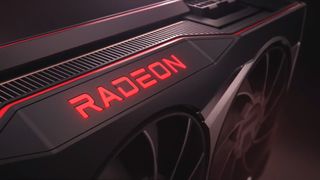Overclocked AMD Radeon RX 6800 XT performance apparently matches the Nvidia RTX 3090
The blows just keep coming

It’s been a big year for both Nvidia and AMD, with next-gen releases fighting to top the ‘best graphics cards’ lists. Recent weeks have been great for fans of AMD products as GPU (graphics processing unit) benchmarks appear to tear Nvidia down from its lofty perch as the reigning market overlord, and we’ve just seen AMD’s overclocking speeds deal another blow.
- AMD Radeon RX 6800 XT: release date, price and news
- AMD vs Nvidia 2020: which makes the best graphics cards?
- Check out these early Black Friday deals
We had our hopes up regarding rumors of AMD’s line of GPUs exceeding their officially listed frequencies, but these whispers may now have some weight to them. In a now-deleted tweet from Twitter user Raichu (@OneRaichu) the Radeon RX 6800 XT was reportedly shown clocking speeds beyond 2.5 Ghz, breaching its expected 2.25 GHz.
Not only that, but the largely censored screenshot also indicated that the power draw fell under the cards official specification of 300W.
6800XT is very well.It can OC to 2.5+Ghz and perf close to 3090...November 12, 2020
As mentioned above, these clock speeds are close to the performance of the Nvidia RTX 3090 which would open up possibilities for the AMD card to actually outperform the Nvidia flagship GPU in some AAA games, as we saw in AMD’s official launch event.
The potential mining performance of the RTX 6800 XT was also noted by Twitter user @Kopite7kimi to be much lower than that of the RTX 3080, which is great news for gamers wanting to avoid any available stock being snapped up by cryptocurrency miners.
This is certainly looking to be the year of AMD, providing the graphics cards perform as well in real-life application as they do in these leaked benchmarks.
- Take a look at our guide for the best gaming PCs available in 2020
Get daily insight, inspiration and deals in your inbox
Get the hottest deals available in your inbox plus news, reviews, opinion, analysis and more from the TechRadar team.
Jess is a former TechRadar Computing writer, where she covered all aspects of Mac and PC hardware, including PC gaming and peripherals. She has been interviewed as an industry expert for the BBC, and while her educational background was in prosthetics and model-making, her true love is in tech and she has built numerous desktop computers over the last 10 years for gaming and content creation. Jess is now a journalist at The Verge.

